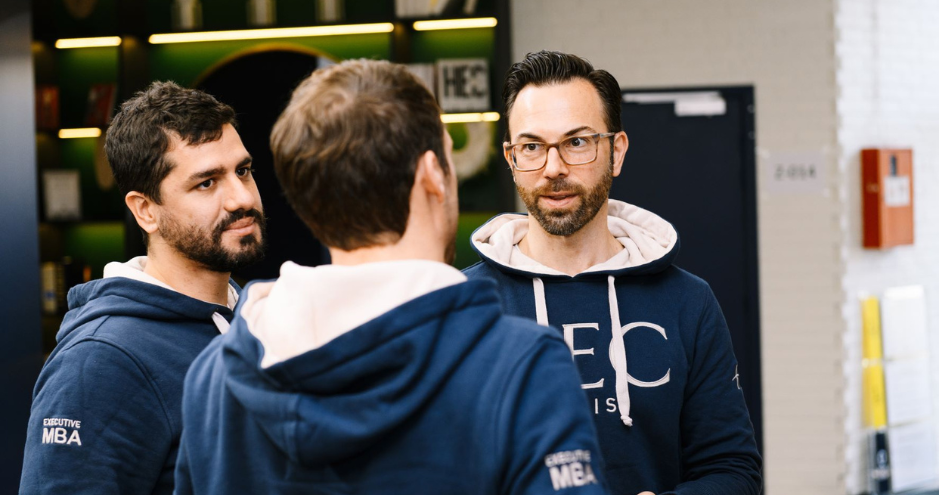What is the HEC Paris EMBA Capstone Project?

As its name suggests, the Capstone Project is the cherry on top of the 18-month Executive MBA cake. An extensive, intensive exercise in innovative problem-solving and analytical research carried out by each participant, the Capstone carries with it a reputation as a potential game-changer in the participant’s career trajectory.

From day 1 of the HEC Paris EMBA program, the Capstone project looms large. But what is it exactly?
The HEC Paris Executive MBA Capstone is an industry standard business project report of quality befitting the board of directors for any cutting edge firm around the world. It is a case of real-world impact, packed with powerful insights and delivered with the requisite executive polish expected of students in the culmination of their EMBA.
Practically speaking, the Capstone Project allows students to prove that they have the tools to pursue a consequential intra- or entrepreneurial project, whether that means taking a leading general management role in their company (or advising) or founding their own company altogether.
What does a finished HEC Paris Executive MBA Capstone Project look like?
The final deliverable of the HEC Paris Executive MBA Program can take many forms. It is also important to be aware of what it is not: an academic thesis.
Whether that be a business plan for the student's dream company, a research proposal for a brand-new unit in their existing one, or a deep-dive into market research that students use in promotion interviews, the Capstone Project is an impactful piece of work that offers real added value.
All in all, the Capstone Project is an opportunity to conclusively project oneself into the forefront of one’s current or future professional environment.
As different as the possibilities are, all share a common foundation: the most successfult projects are underpinned with ambition, rigor, and clarity of thought. These elements coalesce into a cogent, skillfully constructed and supported argument that inspires and persuades the target audience—whomever they may be—with the confidence to follow the project's recommendations and to entrust and empower the participant with the endeavor’s success.
If participants get that combination just right, the sky is the limit.
How can the EMBA Capstone Project directly impact career growth?
Given the fact that the Capstone Project is a reflection of each individual's professional background, strengths, and aspirations, the “ideal” project takes many forms. Some students arrive at the program with a project in mind. Others take the beginning of the program to settle on their project ideas. Still others arrive set on a project idea, but have their minds (and sometimes their careers) changed by the first part of the program and decide to pursue another.
In all their forms, the recent past is replete with examples of the breadth and depth of Capstone possibilities.
Arnaud Naudan (E.20), parlayed a strong capstone project of his ambitions for his firm’s future into a promotion to CEO at BDO France.
Donatella Ponziani (E.19) used her Capstone project as the foundation for what would become a brand-new agile business unit at the European Space Agency.
Bola Bardet (E.18), a veteran of some of the world’s most prestigious investment funds, turned personal tragedy and a keen eye for niche opportunities into her own flourishing healthcare startup.
Three tips to ensure the success of your “ideal” Capstone Project
A few key factors heavily influence fulfilling a project’s potential.
- First, the project is a serious undertaking in prioritization and time management, and participants need to plan accordingly. In terms of the EMBA and in terms of the Capstone Project, time is of the essence, and its value cannot be understated.
- Second, students should make sure to choose a topic for which they have reliable access to relevant sources of information. They should also have an accountability “sponsor”—an individual nearly as invested in the project’s success as the participant themselves— who eagerly waits for an answer to the question they chose to answer. Depending on the project, this sponsor can be the participant themselves (if working on their future entrepreneurial project), their boss if the topic is about their current employer, or a senior executive of the company for which they are working as an external consultant.
- Third, the most successful participants work closely with their Capstone advisor. As recognized subject matter experts from their chosen fields, she or he is there as a willing and experienced sounding board— they’ve been there, done that— and as such is a deeply valuable resource. These advisors are sourced in partnership with HEC Paris and its sprawling professional network; some number among the school’s 68,000-strong alumni network. The most successful participants use these advisors judiciously.
As soon as participants are accepted into the program, they should begin devising an approach to their Capstone project.
Fortunately, for the entire duration of their EMBA, they will be privy to workshops focused on fine-tuning the granular points of their Capstone projects along each stage of the process.